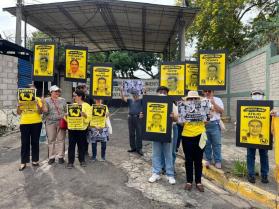FMLN and Social Movement Unite Against Persecution of Organized Vendors, Privatization of Health Car
The movement of organized informal market vendors has been gaining steam recently in El Salvador. Back on May 30, Salvadoran Security Minister Rene Figueroa, along with director of the National Civilian Police (PNC) Rodrigo Avila, announced they were issuing arrest warrants for leaders of the National Vendors Movement, including Martin Montoya and Sandra Henriquez. Since then, the social movement has organized a campaign denouncing the political persecution against organized vendors and their allies.
FMLN and social movement protest against privatization of health
On June 16 the Salvadoran social movement once again took to the streets to protest the privatization of health care, reactivating the historic marcha blanca (white-clad marches) initiated in 2003. The activity was organized by the FMLN in coordination with health care organizations and new coalitions formed in the past year against the steps towards privatization taken by the Saca government.
More than 20,000 people marched from downtown San Salvador to the neighborhood where many national hospitals are located. Two of the major hospitals, the maternity hospital and the general hospital Rosales, were damaged in the 2001 earthquakes, for which the government subsequently received more than $140 million in loans for reconstruction. The FMLN voted to approve those loans and has denounced the fact that they have yet to be allocated. The party demands that the funds either be returned or utilized to rebuild 7 national hospitals.
ARENA has already presented a proposal for the modernization of health care, which most social organizations have denounced as a first step towards privatization. Some services such as maintenance and food supplies within the national hospitals have already been privatized.
Saca consolidates civil dictatorship
During the speech celebrating his third year as president Antonio Saca announced a plan for approving addition loans that would involve a new, unconstitutional tactic: establishing a so-called trust fund of $350 million, and doing so without a 2/3 majority of votes in the Legislative Assembly. In April the right-wing ARENA party failed to ram through a package of loans totaling more than $400 million, and thus this new tactic is the partys attempt to subvert the power of the FMLN, which has refused to approve any new loans.
The trust that Saca is proposing would involve the selling of bonds with which the government would obtain the necessary $350 million. The bonds would be administered by the Multi-sector Investment Bank which would then pass it on to the government to supposedly spend on security and health.
Sacas plan to create the trust without approval in the Legislative Assembly violates Article184 in the SalvadoranConstitution which states that all loans or public debt must be approved by a 2/3 majority in the Assembly. ARENA has been weak in defending the creation of the trust, making serious contradictions by first denying that it would further public debt, then admitting that it would increase debt for the benefit of the Salvadoran people.
The FMLN strongly opposes the creation of the trust and has pledged to present an unconstitutionality bill to the Supreme Court of Justice, while publicly stating that Sacas attempt to take away the power of the Legislative Assembly is part of consolidating ARENAs civil dictatorship. At the same time, the FMLN has denounced the increading rate of the Salvadoran external debt, demanding that if the government simply taxed the rich (i.e. the ARENA leaders themselves), then El Salvadors revenue would double and make further loans unnecessary.
FMLN continues the battle for electoral reforms
While rumors continue to circulate about possible candidates for the 2009 Salvadoran legislative, municipal and presidential elections, the priority of the FMLN in the electoral process has been to push for legislative approval of three key reforms to the electoral system.
The first reform relates to the national registry. Currently, ARENA has control over the voter registry, helping the right-wing perpetrate its fraudulent and illegitimate victories of the past. According to the FMLN, the registry must be updated and made accessible to all parties. The second reform is the implementation of the residential vote, a step that could also prevent ARENA from committing fraud (such as bringing people from Honduras and Nicaragua to vote, having people voting in more than one municipality, etc.) The third reform is to limit the power of the president of the Supreme Electoral Tribunal (TSE) given that he is an active member of ARENA.
The Electoral Commission created by the Legislative Assembly has approved the implementation of the residential vote but changes to the TSE are pending. According to the FMLNs electoral calendar these reforms must be approved by September 2007; if not, the 2009 electoral process is destined to be corrupted by the same fraudulent tactics used in past years.
Finally, this past weekend, the TSE announced another important reform: the separation of municiple and legislative elections (now scheduled for January 2009) from the presidential elections (scheduled for March 2009.) The FMLN disapproves of the separation as it would double the cost of the electoral process. Eugenio Chicas, magistrate for the FMLN in the TSE, declared that the move was a desperate measure by ARENA proving its fear of a possible FMLN victory in 2009. He also pointed out the irony of ARENA impeding the residential vote (for financial reasons) while favoring a huge budget increase that would result from separating the elections.

 "I am a CISPES supporter because continuing to fight for social justice and a more people-centered country means continuing the dream and sacrifice of thousands of my fellow Salvadorans who died for that vision.” - Padre Carlos, New York City
"I am a CISPES supporter because continuing to fight for social justice and a more people-centered country means continuing the dream and sacrifice of thousands of my fellow Salvadorans who died for that vision.” - Padre Carlos, New York City

